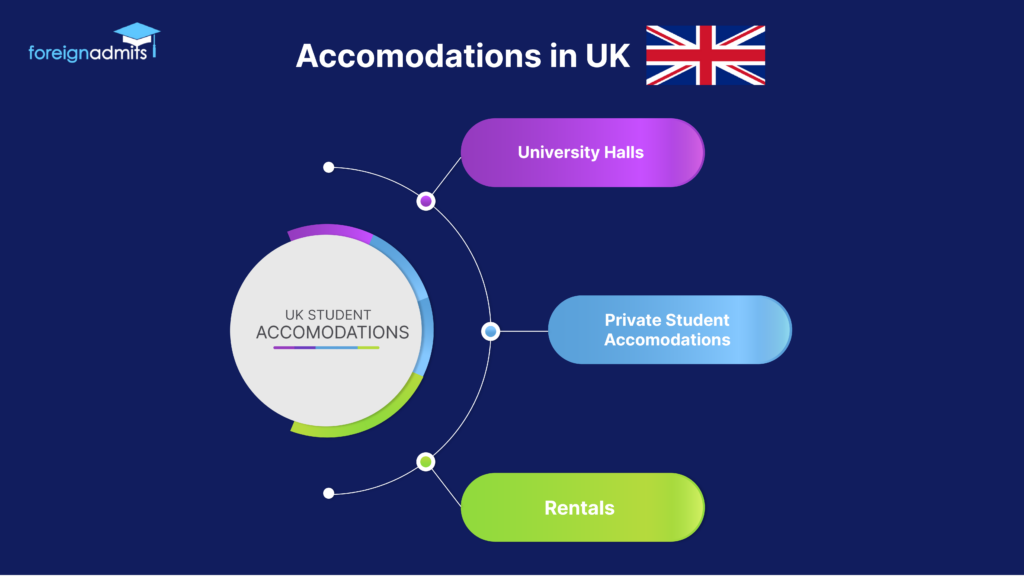The United Kingdom is home to some of the world’s most prestigious universities. No wonder it makes an attractive option for students who are willing to study abroad, more specifically study in UK. As per the statistics provided by universitiesuk.ac.uk, a total of 538,615 international students were studying in UK in the academic year 2019/20. Some of the UK’s (and the world’s) top universities list famous names like the University of Oxford, University of Cambridge, University College London, Imperial College, etc. Now, what is it like to study in UK and what do you need to do so? Let’s find out further in this article.
UK Scholarships for International Students
There are a number of options when it comes to scholarships for international students to study in UK. These scholarships are funded by both Government and the universities themselves. Some of these scholarships are fully funded while others are partially funded. The annual amount received can be anywhere from £2000 to £5000, depending on the body providing it. They cover all the levels of higher education, which are bachelor’s, master’s, and doctorate degree programmes. And like most scholarships, the deciding factor is exceptionally good academic performance in the past. However, some might need you to take additional qualifying tests as well. Listed down below are some well-recognised UK scholarships for Indian students.
Government-Funded UK Scholarships
- Commonwealth Shared Scholarship Scheme at UK Universities
- Scotland Saltire Scholarship
- Marshall Scholarships
- Chevening Scholarships
- Commonwealth Scholarships for Developing Commonwealth Countries
- GREAT Scholarships
UK Scholarships Offered by Universities
- Gates Cambridge Scholarship
- Edinburgh Global Research Scholarships
- Clarendon Scholarship at the University of Oxford
- Bristol University Think Big Scholarship
- University of York Global Scholarships
- IDS Graduate Scholarship, University of Sussex
- Imperial College President’s Undergraduate Scholarships
Steps to Study in UK
Once you’ve decided to study in UK, it’s time to act upon it. Follow the steps provided below to put your plan into action.
Step 1 – Research and decide on a course and institute
Choose what is right for you. Consider the education you have got so far and what best fits your funding situation. Look up top colleges that offer the courses of your interest.
Step 2 – Register and complete the application process
With a college in mind, it becomes easier for you to find out its application process. Go through the documentation that is required. And finally, complete all the required steps and submit the application before its deadline.
Step 3 – Accept your offer
Once your application has been accepted, you are given a window to accept the offer to study. These offers to study can be conditional and unconditional. In the case of the latter, you can confirm your acceptance straightaway. If you have a conditional offer, it means you may have to appear for some extra tests or interviews. These tests are often conducted over phone or video calls but sometimes, it may be the case that students are asked to appear in person.
Step 4 – Sort out the funding
Determine if you have enough funds to cover your tuition fee. If not, determine if you need a sponsor or scholarships. Look up your options and apply for scholarships in UK and do so well before the deadlines.
Step 5 – Apply for a visa
As an international student, you will require a student visa to study in UK. The type of UK student visa that is applicable to you will determine how long can you stay in the country beyond your course duration and set the conditions for your part-time employment while studying.
Step 6 – Prepare for your stay in UK
Once you are done with all the formalities and documentation, it’s time to prepare for your stay. Look up accommodations for students, book flights, find out what amenities you will get around your accommodation, etc.
Application Process to Study in UK
The college application process is different for undergraduate and post-graduate students. Students who want to pursue an undergraduate degree can apply through UCAS (Universities and College Admission Service) to all universities and colleges in the UK. It makes the process for undergraduates fairly simple. So the steps to follow for undergraduates are –
- Register
- Write your personal statement
- Get reference letters written by your mentors or teachers
- Submit your application before the deadline
*Note – Most applications open in the month of October of each year for the next academic year. The deadline is usually January. However, late applications may be taken until the month of June.
Students willing to get into a post-graduate programme can also find information on the UCAS website. However, many UK universities are responsible for handling their application for post-graduate programmes. So, candidates are often required to apply directly. Another service that students can use to apply for postgraduate courses is UKPASS. Virtually, there are no deadlines if you apply through UKPASS. It allows you to apply for a maximum of 10 universities/ colleges at once.
Similarly, those who want to get into drama, music and dance courses can apply through UCAS Conservatoires and students who want to take a teacher training course can apply through UCAS Teacher Training website.
Documents Required while Applications
The documents that students need to produce while applying to study in UK are pretty much the same for undergraduate and postgraduate programmes. The list of documents is also quite similar for every university. Some of these documents are listed below.
- Visa & passport
- Academic transcripts
- Personal statement (SOP)
- Letters of Recommendation from previous teachers/ lecturers
- Copies of your degree(s) (if any)
- Your English language test scores (scores obtained in IELTS, TOEFL, PET, etc.)
- Entrance test scores
- Resume/ CV
- Work experience certificates (if applicable)
*Note – LORs and reference letters are to be printed on official letterheads of the institutes the referees are affiliated to.
UK Student Visa
In order to get a student visa for UK, you need to take into consideration the level of education you will be pursuing in the country. Based on that, you can be issued a General Tier 4 student visa, child student visa or short-term study visa. The eligibility criteria and the cost of application for these three types of visas have been provided below.
| Types of UK Student Visa | Who Can Apply | Cost of Application |
| Tier 4 Student Visa | Students aged 16 or over with a course offer from a UK institute | £348 (additional £348 per dependant) |
| Child Student Visa | Students between the ages 4 to 17 with a course offered in UK | £348 + Healthcare Surcharge |
| Short-Term Student Visa | Students with an offer of a short-term course in UK (usually an English Language Course or a training course) | £97 (for 6 months)£186 (for 11 months) |
Important points to keep in mind about UK student visa –
- Students can apply for a UK visa 3 months prior to the commencement of their course.
- International students can arrive in the UK a month before their course begins if the course is longer than 6 months.
- If the course duration is 6 months or lesser, they can arrive a week prior.
- The students must be able to speak, read and write English.
Documents Required for UK Student Visa Application –
- A current passport
- CAS (Confirmation of Acceptance for Studies) reference number and documents used in college applications
- A Government approved identity (Driver’s License/ Aadhaar Card)
- Coloured passport sized photographs
- Assessment documentation
- Evidence of funds required for the duration of your course
*Note – This is a general list of basic documents required while applying for a UK visa, you’ll be informed of any other required documents by your local visa office.
Exams to take to get into a UK university
Students who aim to study in UK must take a language proficiency test. Apart from that, they may also be required to take field-specific entrance exams (LNAT for law, MAT for mathematics, BMAT for medical studies, etc.)
The average score required for IELTS is 7.0, for PTE, it is 51 and for GRE, it is over 163/780. These scores can slightly vary from university to university. The average required score may be low for PTE but candidates who score 65-75 are preferred by top universities. Many colleges in the UK, today, do not consider GRE scores as a criterion for selecting students. However, some still do. It is also possible to study in UK without IELTS since many universities waive it under certain conditions.
If you intend to get a business degree from the UK, you will have to appear for GMAT. in addition to the aforementioned language proficiency tests. The test is designed to test the candidates’ reasoning ability, quantitative knowledge, grammar and verbal abilities.
Top 10 Courses to Study in UK
Most international students intend to study in UK to get a master’s degree. More specifically, business degree programmes attract more international students than any other course. It makes for a good option because of the numerous scholarship options like the Cambridge MBA Scholarship, etc. MBA in UK is closely followed by courses in the fields of engineering, medical sciences, law, architecture, etc. Given down below is a list of the top 10 popular courses in the UK.
- Business & Management
- Medicine, Nursing, Preclinical Medicine & Dentistry
- Economics, Finance & Accounting
- Engineering
- Architecture
- IT, Data Sciences & Computer Sciences
- Law
- Arts, Humanities & Design
- Psychology
- Political Science
*Check-Out Top 10 Universities in UK for MBA
Cost of Living in UK
The total expense of living in UK as a student is a mix of tuition, bills and miscellaneous spending. There is no denying that many international students, including Indians, find it expensive in contrast with cheaper resources back home. In an ideal world, the cost of living in UK includes tuition fees, accommodation, food, utilities, transportation, and taxes (applicable in the case of part-time jobs alongside academics). Moreover, the cost also depends largely on the location of your institute and accommodation. There’s no doubt that it is cheaper to live outside of big cities like London. Now, let us take a look at how much the aforementioned amenities cost.
| Particulars | Cost |
| Tuition Fee (Undergraduate) | £7000 to £10,000 per year |
| Tuition Fee (Postgraduate) | £15,000 to £25,000 per year |
| Accommodation (Outside London) | £550 to £650 per month |
| Accommodation (London) | £1000 to £1500 per month |
| Utilities | £200 to £350 per month |
| Sustenance | £150 to £300 per month |
| Transportation (Outside London) | £100 to £150 per month |
| Transportation (London) | £150 to £200 per month |
Finding Student Accommodation in UK

By now you already know that accommodation in London for students is more expensive as compared to other cities in the UK. It also happens to be that most of the top universities and colleges are located in London, so there’s no escaping it. But do you know how to actually look for a place to live in the UK? Students can choose between living in university halls, private student accommodations, or rentals. This means, ideally, you need to pick an option that best suits your needs and budget. The UCAS website also has some resources for accommodation.
Points to consider while finding student accommodation in UK
- Check if the rent fits your budget.
- Also check if necessary amenities like hospitals, grocery stores, bus stations, etc, are nearby.
- You will also have to consider the money you spend daily on transport on your way to school or work.
- Ensure that the area you plan to stay in is safe.
- Find out if your rent covers your electricity, gas, and water bills.
- Also take into consideration the furniture and services provided by the renter like laundry, wifi, kitchen equipment, etc. Your landlords may or may not provide it.
- It is equally important that the place is comfortable and feels like home.
*Also Read – Student Accommodation in Exeter
Can You Study in UK After Class 12?
Do students from other countries move to the UK right after high school? The simple answer to this question is, yes. Many Indian students happen to study in UK after class 12th. All it takes is good academic performance during the high school years. The requirements for Indian students to be able to study in the UK after 12th are tabulated below.
| Particulars | Requirements |
| Age | 18 years or above |
| Marks obtained in class 12 (Science/ Commerce) | 70% or above |
| Marks obtained in class 12 (Arts) | 65% or above |
| SAT/ ACT scores | 400 – 1600 (varies from university to university) |
| English Proficiency Test Scores | The minimum score set by universities individually |
If you fulfil these minimum requirements, you need to decide on which course you want to pursue. Keeping in mind these requirements, do your research and find out what are the universities that provide the courses of your choice. Also, figure out if you need to apply for scholarships or if you will be able to fund your bachelor’s degree programme independently. If everything seems to be working out, you will be able to study in one of the most prestigious colleges in the world.
Job Opportunities for Graduates from UK
Acquiring a degree from the UK increases your value as a potential employee in the eyes of employers all over the world. Consequently, the number of opportunities also increase. As a fresher with low experience, it is possible to bag a job with a starting salary of £20,000 to £80,000 per year. However, the figures vary for different fields of work and levels of expertise. Some of the highest-paying jobs in the UK that remain in demand each year are in marketing, advertising, healthcare, education, data science, etc.
A brief data of different fields of work and their average pay is provided below.
Average Salary for UK Graduates
| Job Title | Average Annual Salary (Initial) |
| Architect | £40,600 – £129,000 |
| Accountant | £24,200 – £77,000 |
| Civil Engineer | £33,700 – £107,000 |
| Graphic Designer | £20,100 – £69,400 |
| HR Manager | £54,900 – £162,000 |
| Lawyer | £65,500 – £226,000 |
| Sales Manager | £62,200 – £198,000 |
| Software Developer | £31,500 – £109,000 |
UK Student Experience

The way international students experience the United Kingdom is not limited to top-notch academics. They also expose themselves to a young multicultural society of students and seasoned professionals as their faculty. People pour in from all over the world in UK to get an education. You get to share experiences with them. In addition to that, entertainment and leisure activities are different from those in your home country. You can taste food from across the continents in London itself. There are many social events that university goers tend to take part in. The weather is different and even the shared language of English has colloquial differences. And thus, living in UK can be a very enriching experience for individuals.
FAQs
Ques – Is it possible to get an MBA from UK without work experience?
Ans – Yes, getting an MBA without work experience is possible in the UK. However, there are pros and cons to doing so. One of the pros is that you are in touch with your academic life and that you are used to the grind. Working after studying and then getting an MBA creates a gap and distances you from academic life.
Ques – Does it always rain in the UK?
Ans – No. It does rain heavily from September through the winters and into the early summer which can seem a lot compared to most of the other countries. But you do get some sun every day.
Ques – What are some low-budget universities in UK for masters?
Ans – Leeds Trinity, Staffordshire, the University of Bolton, etc. are some of the top inexpensive universities in the UK.
Ques – What is the average cost of living in UK?
Ans – If you study in London, the average cost of living can be £1250 to £1300 a month. The cost significantly decreases outside of London. Cardiff is the most affordable for international students.
Ques – Do I have to work part-time while studying in London?
Ans – London is an expensive city to live in. Consequently, most students studying in London have part-time jobs to take care of additional expenses.
Ques – Can I work in UK as an international student?
Ans – Yes, UK Student Visa allows international students to work a maximum of 20 hours per week when classes are ongoing. These students can also work longer hours/ full time during holidays.
Ques – Do I need special medical insurance to study in UK?
Ans – No. You will be required to pay an additional £150/ year while paying your visa application fee. This is fee is towards you getting access to the NHS.
